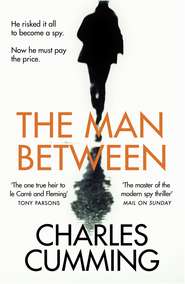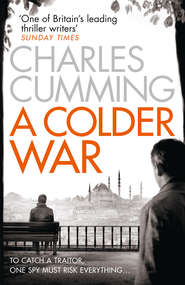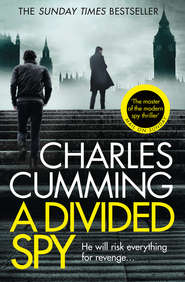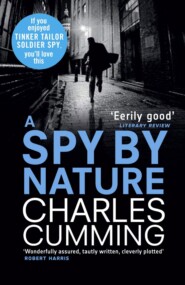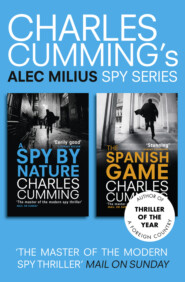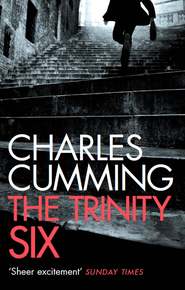По всем вопросам обращайтесь на: info@litportal.ru
(©) 2003-2024.
✖
A Foreign Country
Автор
Год написания книги
2019
Настройки чтения
Размер шрифта
Высота строк
Поля
It was a measure of Kell’s self-confidence, as well as his conviction in Barbara’s ability to detain Pierre, that he took the risk of printing out a three-page summary of Amelia’s stay, including details of her room service orders, laundry bills and any phone calls she might have made from the landline in her room. He then returned to the welcome page, took the documents from a printer in the office, folded them into his back pocket and walked outside to the reception desk. There was a Magstripe Encoder beside the keyboard. Kell switched it on, followed the read-out to ‘Check-In’, typed in ‘218’, set an expiration date of six days and pressed ‘Create’. There was a small pile of white plastic cards to the right of the machine. He pushed one of them into the slot, listened as the information was written into the strip, then withdrew the card and placed it in the same pocket into which he had folded Amelia’s bill.
By the time Pierre came back, more than five minutes later, Thomas Kell had removed almost all of the shards of glass that had fallen on to the floor in the lobby and was busy picking petals of potpourri out of the carpet.
‘You should not have worried about this, Monsieur Uniacke.’
‘I just wanted to help,’ Kell told him. ‘I’m so sorry. I feel terrible about what happened.’
11
The second-floor corridor was deserted. Kell walked towards Room 218 with only the hum of the hotel’s air-conditioning for company. He was suddenly extraordinarily tired; the adrenalin of duping Pierre had dissipated from his body, leaving him with the remnants of a late night and a Hackney hangover.
He put the card key in the slot, watching as the light above the handle clicked to green, then passed into Amelia’s room, closing the door quietly behind him. As he did so, he experienced a sudden flash image of her naked body sprawled across the bed, a nightmare of violence and blood, but it passed from his mind as no more than a brief and absurd hallucination.
The bed had been made, Amelia’s clothes and personal effects tidied away by a chambermaid. The layout of the room was identical to his own: a television facing the bed, bolted to the wall above a writing desk; a sash window with a narrow balcony looking down on to Boulevard Dubouchage. Kell went into the bathroom and made a detailed assessment of its contents. No toothbrush or toothpaste, but a plastic contact lens case and a bottle of ReNu cleaning fluid. No hairbrush, no glasses, no trace of Hermès Calèche, Amelia’s preferred perfume. She had known that she was going somewhere specific and packed accordingly.
He looked in the wardrobe. There was a small metal safe on one of the shelves, the door closed. Ordinarily, an officer as experienced as Amelia Levene would never risk securing anything valuable behind a lock that could be opened by a concierge in under thirty seconds, but she would have gambled on zero threat from London. Kell pulled the safe away from the wall and turned it through one hundred and eighty degrees. There was a metal panel on the back with the make and serial number of the safe engraved beneath a film of dust. Kell wiped it clean and called Tech-Ops. He used the clearance code given to him by Marquand and requested a four-digit access pin for a Sentinel II safe, dictating the serial number to a sleepy technician somewhere in the bowels of Vauxhall Cross.
‘SMS all right for response?’ he was asked.
Kell said that would be fine.
Beneath the shelf was a large suitcase, but no sign of the leather carry-on bag that Amelia habitually took with her on most short-haul flights. A suit jacket and skirt were hanging in the next cupboard, but he knew of no woman who would travel to the south of France with fewer than three outfits; Amelia must have been wearing one of them and packed at least one other. He pulled the suitcase out on to the carpet and flipped it open. There were two crumpled shirts, some underwear and a pair of tights. She was using it as a temporary laundry bag. The lid of the case had a zip-up lining inside which Amelia had left a couple of paperback books, a headset, an unopened packet of cigarettes and a copy of Prospect magazine. Kell felt around the edges of the case, probing for anything that might have been concealed in the lining, but there was nothing there. He put the suitcase back in the cupboard and sat down on the bed.
It was 2.47 a.m. Somewhere on the street outside a cat screeched. Kell thought of the Knights: Barbara in her room a few doors down the corridor; Bill on his way back to Menton. They had arranged to meet in Vieux Nice for lunch, an appointment Kell would almost certainly cancel. His work with them was done. He experienced an overwhelming desire to stretch out on the bed and to catch a few hours’ sleep, but knew that such a thing was not yet possible. He checked the drawers on either side of the bed but found only an inevitable copy of the Gideon Bible and a couple of pillow chocolates, still in their silver wrappers. He checked under the bed for a laptop, a file, a mobile phone, lifting the mattress clear of the frame, but found only lint and dust. The drawers of the desk contained writing paper, as well as a guide to Nice et Les Alpes-Maritimes and some basic information about the hotel. Apart from the safe, Kell could think of nowhere else that Amelia might plausibly have hidden anything that would throw up a clue as to her whereabouts. His only other lead was the number of a French mobile phone listed on the printout from her room. He had called Marquand’s contact at GCHQ for a trace on it five minutes after saying goodnight to Pierre in the lobby.
‘It might take us a few hours,’ a sprightly voice in Cheltenham had informed him. ‘Gets busy this time of night with AF/PAK waking up.’
Kell wondered who would contact him first. Tech-Ops or GCHQ? It felt like a race to see who could be more indifferent to his circumstances. He returned to the bathroom and checked the toilet cistern as well as the pockets of two dressing-gowns hooked behind the door. On the basis that Amelia might have lifted them in order to conceal a passport or SIM card, he searched for loose tiles and areas of carpeting in both the bathroom and the bedroom. Nothing. He shook out the curtains, he tried to peer behind the television. Finally, he gave up.
Why the hell hadn’t London called? Was it his clearance code? Tech-Ops might have rung it in, creating a dawn shitstorm for Marquand that would land both of them in trouble.
Kell was lying on Amelia’s bed, planning to catch a few hours’ rest, when the SMS finally came through. He climbed off the bed, punched the four-digit code into the safe and heard the satisfying grind of the lock pulling out, the door swinging open on a weighted hinge.
There was a single object inside the safe, positioned dead centre, the cat burglar’s prize. A set of car keys. An Avis sticker on the plastic casing, two remote buttons to activate a central locking system, a metal key that swung out at the push of a button.
Kell locked the safe, put the keys in his pocket and left the room.
12
‘You cannot sleep, Monsieur Uniacke?’
Kell was grateful for the ready-made lie. He braced his hands across the counter at reception, summoned a careworn smile, and explained that insomnia had plagued him for years and that a brisk walk around the block usually cured it.
‘Of course. Let me get the door for you.’
He noted the pristine carpet, cleansed of the remaining glass and potpourri, and again thanked Pierre for clearing it up as he followed him down the short flight of steps towards the entrance of the hotel. Five minutes later he was at the coded gate of his underground car park on Place Marshall, working on the assumption that Amelia would have left her vehicle at the same location.
He was wrong. Descending through four subterranean levels, along a yellow-lit corkscrew of silence and stale air, Kell searched in vain for the winking lights of Amelia’s hire car, pressing repeatedly on the remote-control lock. In the basement of the car park he turned and walked back up to street level, following the same procedure, but again to no avail. A nightwatchman was snoozing in a hutch behind a parking barrier, his feet on the desk, arms folded across a copy of Paris Match. Kell tapped on the window and woke him up.
‘Excusez-moi?’
No part of the nightwatchman’s body moved save for his eyes, which flipped open like a child’s doll.
‘Oui?’
‘I think I parked here this morning, but I can’t find my vehicle. Is there another car park nearby?’
‘Etoile,’ the nightwatchman muttered, closing his eyes.
‘I’m sorry?’
‘Nice Etoile. Rue Lamartine. Cinq minutes à pied.’
The second underground car park was equidistant from the Hotel Gillespie, five minutes from Place Marshall. Kell walked there in the still of the night, a stranger on deserted French streets. He followed the same routine, going from floor to floor, pressing the infra-red key, looking for Amelia’s car.
Finally he found it. She had parked on the second lower level. Kell was turning through three hundred and sixty degrees, eyes scanning every corner of the garage, when he saw a set of rear lights morsing in the distance. A dark blue Renault Clio squeezed in between a battered white van and a black Seat Altea with Marseilles plates. A film of dust on the windscreen. Kell went straight to the boot. There was an umbrella in the back and a pair of walking boots. He took them out, placed them on the ground, then lifted up the false floor in order to access the spare wheel. It was screwed in and secured by a plastic clip on a cable looped through the centre of the tyre.
Kell pulled the tyre free, let it spin and rock on to the ground, and immediately saw a cloth package concealed in the hollow. Wrapped in a pillow case from the Hotel Gillespie were Amelia Levene’s passport, her driving licence, her credit cards and house keys. She had placed a SIM in a small protective cover, wrapped three hundred pounds sterling in an elastic band and put her BlackBerry, to which she was usually attached like a drip, inside a padded manila envelope.
Kell put the SIM and the BlackBerry in the pocket of his coat and searched the rest of the car. She had barely driven it. There was a nearly crisp sheet of paper, emblazoned with the Avis logo, still protecting the footwell on the driver’s side. He could see mud on the surface, created by the soles of Amelia’s shoes. Kell replaced the spare wheel, put the pillow case, the umbrella and the walking boots back in the boot, and locked the car. He returned to street level, walked three hundred metres east along Boulevard Dubouchage and rang the doorbell of the Gillespie.
‘So, you feel ready to sleep now?’ Pierre asked him, looking at his watch like a bad actor.
‘Ready to sleep,’ Kell replied, and thought about yawning for effect. ‘Do me a favour, will you?’
‘Of course, Monsieur Uniacke.’
‘Cancel that alarm call. I’m going to need more than three hours’ sleep.’
13
Yet sleep never came.
Thomas Kell took a shower, climbed into bed and tried to shut out the day’s events, even as they replayed continuously in his mind. He had called Marquand for an update on the French mobile and requested tech support on the BlackBerry SIM. It was already past 4 a.m. He knew that Marquand would call back before seven and that Cheltenham would have a fix on the French mobile within a few hours. There hardly seemed any point even in closing his eyes.
The room then became strange to him, the quietness of it, the half-light. Kell felt his own solitude as intensely as he had known it at any stage since his departure from Vauxhall Cross. It occurred to him, as it often did in the depths of the night, that he knew only one way of being – a path that was separate to all others. Sometimes it felt as though his entire personality had grown out of a talent for the clandestine; he could not remember who he had been before the tap on the shoulder at twenty.
What had become of the life he had dreamed of, the life he had promised himself on the other side of the river? Kell had told anyone prepared to listen that he was planning to write a book. He had convinced himself that he was going to study to become an architect. Both were notions that now seemed so absurd that he actually laughed against the silence of the room. He had tried, day after day in the grey winter months of a new year, to behave like an ordinary citizen, to become the sort of man who socialized and watched the football, who made small talk with strangers in pubs. He was determined to re-educate himself – to watch the films and the HBO box sets, to read the novels and the memoirs that had passed him by – but all he knew was the calling of the secret world. He had even believed, against all evidence, that he might finally become a father. But that particular dream was now as far away from him, as transient, as the whereabouts of Amelia Levene.
He thought then of George Truscott, the man who surely stood to gain the most from Amelia’s continued absence. In the restlessness of his insomnia, Kell even wondered if Truscott himself had arranged for Amelia to disappear. Why else have her followed in Nice? Why else send Thomas Kell, of all people, to track her down? He opened his eyes to the blackened room and could make out only the faint yellow glow of a streetlamp in the window. He despised Truscott, not for his ambition, not for his cunning and trickery, but because he represented all that Kell loathed about the increasingly corporatized atmosphere within SIS; what mattered to Truscott was not the Service, not the defence of the realm, but his own personal advancement. With a lower IQ and a fractionally smaller ego, Truscott would likely have worked in some parallel career as a traffic warden or council inspector, dreaming at night of punching parking tickets and issuing directives against noise pollution. Kell would have laughed at the thought, but was too depressed by the prospect of Truscott ascending to ‘C’, bringing with him yet more apparatchiks, yet more corporate lawyers, while simultaneously sacrificing talented officers on the altar of his fastidiousness. Amelia Levene was almost certainly the last roadblock preventing SIS from turning into a branch of the Health and Safety Executive.
In the end, it was the hotel that rang. Pierre had forgotten to cancel the wake-up call. Kell’s phone lurched him out of bed at exactly seven o’clock. He reckoned that he had been asleep for no more than half an hour. Ten minutes later, back in the shower, he heard the familiar ring of the mobile. His head swathed in shampoo, Kell swore under his breath, switched off the water and stepped out of the bath.
It was Marquand, sounding chipper.
‘Bonjour, Thomas. Comment allez-vous?’
Rule One of SIS was never to moan, never to show weakness. So Kell mirrored Marquand’s supercilious tone and said: ‘Je suis très bien merci, monsieur,’ as though he was addressing a French teacher at a primary school.






